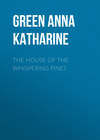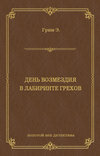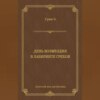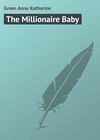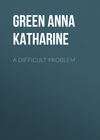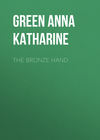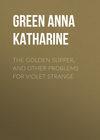Читать книгу: «The House of the Whispering Pines»
BOOK ONE
SMOKE
I
THE HESITATING STEP
To have reared a towering scheme
Of happiness, and to behold it razed,
Were nothing: all men hope, and see their hopes
Frustrate, and grieve awhile, and hope anew;
But—
A Blot in the 'Scutcheon.
The moon rode high; but ominous clouds were rushing towards it—clouds heavy with snow. I watched these clouds as I drove recklessly, desperately, over the winter roads. I had just missed the desire of my life, the one precious treasure which I coveted with my whole undisciplined heart, and not being what you call a man of self-restraint, I was chafed by my defeat far beyond the bounds I have usually set for myself.
The moon—with the wild skurry of clouds hastening to blot it out of sight—seemed to mirror the chaos threatening my better impulses; and, idly keeping it in view, I rode on, hardly conscious of my course till the rapid recurrence of several well-known landmarks warned me that I had taken the longest route home, and that in another moment I should be skirting the grounds of The Whispering Pines, our country clubhouse. I had taken? Let me rather say, my horse; for he and I had traversed this road many times together, and he had no means of knowing that the season was over and the club-house closed. I did not think of it myself at the moment, and was recklessly questioning whether I should not drive in and end my disappointment in a wild carouse, when, the great stack of chimneys coming suddenly into view against the broad disk of the still unclouded moon, I perceived a thin trail of smoke soaring up from their midst and realised, with a shock, that there should be no such sign of life in a house I myself had closed, locked, and barred that very day.
I was the president of the club and felt responsible. Pausing only long enough to make sure that I had yielded to no delusion, and that fire of some kind was burning on one of the club-house's deserted hearths, I turned in at the lower gateway. For reasons which I need not now state, there were no bells attached to my cutter and consequently my approach was noiseless. I was careful that it should be so, also careful to stop short of the front door and leave my horse and sleigh in the black depths of the pine-grove pressing up to the walls on either side. I was sure that all was not as it should be inside these walls, but, as God lives, I had no idea what was amiss or how deeply my own destiny was involved in the step I was about to take.
Our club-house stands, as it may be necessary to remind you, on a knoll thickly wooded with the ancient trees I have mentioned. These trees—all pines and of a growth unusual and of an aspect well-nigh hoary—extend only to the rear end of the house, where a wide stretch of gently undulating ground opens at once upon the eye, suggesting to all lovers of golf the admirable use to which it is put from early spring to latest fall. Now, links, as well as parterres and driveways, are lying under an even blanket of winter snow, and even the building, with its picturesque gables and rows of be-diamonded windows, is well-nigh indistinguishable in the shadows cast by the heavy pines, which soar above it and twist their limbs over its roof and about its forsaken corners, with a moan and a whisper always desolate to the sensitive ear, but from this night on, simply appalling.
No other building stood within a half-mile in any direction. It was veritably a country club, gay and full of life in the season, but isolated and lonesome beyond description after winter had set in and buried flower and leaf under a wide waste of untrodden snow.
I felt this isolation as I stepped from the edge of the trees and prepared to cross the few feet of open space leading to the main door. The sudden darkness instantly enveloping me, as the clouds, whose advancing mass I had been watching, made their final rush upon the moon, added its physical shock to this inner sense of desolation, and, in some moods, I should have paused and thought twice before attempting the door, behind which lurked the unknown with its naturally accompanying suggestion of peril. But rage and disappointment, working hotly within me, had left no space for fear. Rather rejoicing in the doubtfulness of the adventure, I pushed my way over the snow until my feet struck the steps. Here, instinct caused me to stop and glance quickly up and down the building either way. Not a gleam of light met my eye from the smallest scintillating pane. Was the house as soundless as it was dark?
I listened but heard nothing. I listened again and still heard nothing.
Then I proceeded boldly up the steps and laid my hand on the door.
It was unlatched and yielded to my touch. Light or no light, sound or no sound there was some one within. The fire which had sent its attenuated streak of smoke up into the moonlit air, was burning yet on one of the many hearths within, and before it I should presently see—
Whom?
What?
The question scarcely interested me.
Nevertheless I proceeded to enter and close the door carefully behind me. As I did so, I cast an involuntary glance without. The sky was inky and a few wandering flakes of the now rapidly advancing storm came whirling in, biting my cheeks and stinging my forehead.
Once inside, I stopped short, possibly to listen again, possibly to assure myself as to what I had best do next. The silence was profound. Not a sound disturbed the great, empty building. My own footfall, as I stirred, seemed to wake extraordinary echoes. I had moved but a few steps, yet to my heightened senses, the noise seemed loud enough to wake the dead. Instinctively I stopped and stood stock-still. There was no answering cessation of movement. Darkness, silence everywhere. Yet not quite absolute darkness. As my eyes grew accustomed to the place, I found it possible to discern the outlines of the windows and locate the stairs and the arches where the side halls opened. I was even able to pick out the exact spot where the great antlers spread themselves above the hatrack, and presently the rack itself came into view, with its row of empty pegs, yesterday so full, to-day quite empty. That rack interested me,—I hardly knew why,—and regardless of the noise I made, I crossed over to it and ran my hand along the wall underneath. The result was startling. A man's coat and hat hung from one of the pegs.
I knew my business as president of this club. I also knew that no one should be in the house at this time—that no one could be in it on any honest errand. Some secret and sinister business must be at the bottom of this mysterious intrusion immediately after the place had been shut for the winter. Would this hat and coat identify the intruder? I would strike a light and see. But this involved difficulties. The gas had been turned off that very morning and I had no matches in my pocket. But I remembered where they could be found. I had seen them when I passed through the kitchen earlier in the day. They were very accessible from the end of the hall where I stood. I had but to feel my way through a passage or two and I should come to the kitchen door.
I began to move that way, and presently came creeping back, with a match-box half full of matches in my hand. But I did not strike one then. I had just made a move to do so, when the unmistakable sound of a door opening somewhere in the house made me draw back into as quiet and dark a place as I could find. This lay in the rear and at the right of the staircase, and as the sound had appeared to come from above, it was the most natural retreat that offered. And a good one I found it.
I had hardly taken up my stand when the darkness above gave way to a faint glimmer, and a step became audible coming from some one of the many small rooms in the second story, but so slowly and with such evident hesitation that my imagination had ample time to work and fill my mind with varying anticipations, each more disconcerting than the last. Now I seemed to be listening to the movements of an intoxicated man seeking an issue out of strange quarters, then to the wary approach of one who had his own reasons for dread and was as conscious of my presence as I was of his.
But the light, steadily increasing with each lagging but surely advancing step, soon gave the lie to this latter supposition, since no sane man, afraid of an ambush, would be likely to offer such odds to the one lying in wait for him, as his own face illumined by a flaming candle, and I was yielding to the bewilderment of the moment when the uncertain step paused and a sob came faintly to my ears, wrung from lips so stiff with human anguish that my fears took on new shape and the event a significance which in my present mood of personal suffering and preoccupation was anything but welcome. Indeed, I was coward enough to contemplate flight and might in another moment have yielded to the unworthy impulse if the sound of a second sigh had not struck shudderingly on my ear, followed by the renewal of the step and the almost immediate appearance on the stairs of a young girl holding a candle in one hand and shielding her left cheek with the other.
Life offers few such shocks to any man, whatever his story or whatever his temperament. I had been prepared by the sob I had heard to see a woman, but not this woman. Nothing could have prepared me for an encounter with this woman anywhere that night, after what had passed between us and the wreck she had made of my life. But here! in a place so remote and desolate I had hesitated to enter it myself! What was I to think? How was I to reconcile so inconceivable a fact with what I knew of her in the past, with what I hoped from her in the future.
To steady my thoughts and bring my whirling brain again under control, I fixed my eyes on her well-known form and features as upon a stranger's whom I would understand and judge. I have called her a woman and certainly I had loved her as such, but as, in this moment of strange detachment, I watched her descend, swaying foot following swaying foot falteringly down the stairs, I was able to see that only the emotions which denaturalised her expression were a woman's; that her features, her pose, and the peculiar childlike contour of the one cheek open to view were those of one whose yesterday was in the playroom.
But beautiful! You do not often see such beauty. Under all the disfigurement of an agitation so great as to daunt me and make me question if I were its sole cause, her face shone with an individual charm which marked her out as one of the few who are the making or marring of men, sometimes of nations. This is the heritage she was born to, this her lot, not to be shirked, not to be evaded even now at her early age of seventeen. So much any one could see even in a momentary scrutiny of her face and figure. But what was not so clear, not even to myself with the consciousness of what had passed between us during the last few hours, was why her heart should have so outrun her years, and the emotion I beheld betray such shuddering depths. Some grisly fear, some staring horror had met her in this strange retreat. Simple grief speaks with a different language from that which I read in her distorted features and tottering, slowly creeping form. What had happened above? She had escaped me to run upon what? My lips refused to ask, my limbs refused to move, and if I breathed at all, I did so with such fierceness of restraint that her eyes never turned my way, not even when she had reached the lowest step and paused for a moment there, oscillating in pain or uncertainty. Her face was turned more fully towards me now, and I had just begun to discern something in it besides its tragic beauty, when she made a quick move and blew out the candle she held. One moment that magical picture of superhuman loveliness, then darkness, I might say silence, for I do not think either of us so much as stirred for several instants. Then there came a crash, followed by the sound of flying feet. She had flung the candlestick out of her hand and was hurriedly crossing the hail. I thought she was coming my way, and instinctively drew back against the wall. But she stopped far short of me, and I heard her groping about, then give a sudden spring towards the front door. It opened and the wind soughed in. I felt the chill of snow upon my face, and realised the tempest. Then all was quiet and dark again. She had slid quickly out and the door had swung to behind her. Another instant and I heard the click of the key as it turned in the lock, heard it and made no outcry, such the spell, such the bewilderment of my faculties! But once the act was accomplished and egress made difficult, nay, for the moment, impossible, I felt all lesser emotions give way to an anxiety which demanded immediate action, for the girl had gone out without wraps or covering for her head, and my experience of the evening had told me how cold it was. I must follow and find her and rescue her if possible from the snow. The distance was long to town, the cold would seize and perhaps prostrate her, after which, the wind and snow would do the rest.
Throwing myself against the door, I shook it violently. It was immovable. Then I flew to the windows. Their fastenings yielded readily enough, but not the windows themselves; one had a broken cord, another seemed glued to its frame, and I was still struggling with the latter when I heard a sound which lifted the hair on my head and turned my whole attention back to what lay behind and above me. There was still some one in the house. I had forgotten everything in this apparition of the woman I have described in a place so disassociated with any conception I could possibly have of her whereabouts on this especial evening. But this noise, short, sharp, but too distant to be altogether recognisable, roused doubts which once awakened changed the whole tenor of my thoughts and would not let me rest till I had probed the house from top to bottom. To find Carmel Cumberland alone in this desolation was a mystifying discovery to which I had found it hard enough to reconcile myself. But Carmel here in company with another at the very moment when I had expected the fruition of my own joy,—ah, that was to open hell's door in my breast; a possibility too intolerable to remain unsettled for an instant. Though she had passed out before my eyes in a drooping, almost agonised condition, not she, dear as she was, and great as were my fears in her regard, was to be sought out first, but the man! The man who was back of all this, possibly back of my disappointment; the man whose work I may have witnessed, but at whose identity I could not even guess.
Leaving the window, I groped my way along the wall until I reached the rack where the man's coat and hat hung. Whether it was my intention to carry them away and hide them, in my anxiety to secure this intruder and hold him to a bitter account for the misery he was causing me, or whether I only meant to satisfy myself that they were the habiliments of a stranger and not those of some sneaking member of the club, is of little importance in the light of the fact which presently burst upon me. The hat and coat were gone. Nothing hung from the rack. The wall was free from end to end. She had taken these articles of male apparel with her; she had not gone forth into the driving snow, unprotected, but—
I did not know what to think. No acquaintanceship with her girlish impulses, nothing that had occurred between us before or during this night, had prepared me for a freak of this nature. I felt backward along the wall; I felt forward; I even handled the pegs and counted them as I passed to and fro, touching every one; but I could not alter the fact. The groping she had done had been in this direction. She was searching for this hat and coat (a man's hat,—a derby, as I had been careful to assure myself at the first handling) and, in them, she had gone home as she had probably come, and there was no man in the case, or if there were—
The doubt drove me to the staircase. Making no further effort to unravel the puzzle which only beclouded my faculties, I began my wary ascent. I had not the slightest fear, I was too full of cold rage for that.
The arrangement of rooms on the second floor was well known to me. I understood every nook and corner and could find my way about the whole place without a light. I took but one precaution—that of slipping off my shoes at the foot of the stairs. I wished to surprise the intruder. I was willing to resort to any expedient to accomplish this. The matches I carried in my pocket would make this possible if once I heard him breathing. I held my own breath as I stole softly up, and waited for an instant at the top of the stairs to listen. There was an awesome silence everywhere, and I was hesitating whether to attack the front rooms first or to follow up a certain narrow hall leading to a rear staircase, when I remembered the thin line of smoke which, rising from one of the chimneys, had first attracted my attention to the house. In that was my clue. There was but one room on this floor where a fire could be lit. It lay a few feet beyond me down the narrow hall I have just mentioned. Why had I trusted everything to my ears when my nose would have been a better guide? As I took the few steps necessary, a slight smell of smoke became very perceptible, and no longer in doubt of my course, I pushed boldly on and entering the half-open door, struck a match and peered anxiously about.
Emptiness here just as everywhere else. A few chairs, a dresser,—it was a ladies' dressing-room,—some smouldering ashes on the hearth, a lounge piled up with cushions. But no person. The sound I had heard had not issued from this room, yet something withheld me from seeking further. Chilled to the bone, with teeth chattering in spite of myself, I paused just inside the door, and when the match went out in my hand remained shivering there in the darkness, a prey to sensations more nearly approaching those of fear than any I had ever before experienced in my whole life.
II
IT WAS SHE—SHE INDEED!
Look on death itself!—up, up, and see
The great doom's visage!
Macbeth.
Why, I did not know. There seemed to be no reason for this excess of feeling. I had no dread of attack; my apprehension was of another sort. Besides, any attack here must come from the rear—from the open doorway in which I stood—and my dread lay before me, in the room itself, which, as I have already said, appeared to be totally empty. What could occasion my doubts, and why did I not fly the place? There were passage-ways yet to search, why linger here like a gaby in the dark when perhaps the man I believed to be in hiding somewhere within these walls, was improving the opportunity to escape?
If I asked myself this question, I did not answer it, but I doubt if I asked it then. I had forgotten the intruder; the interest which had carried me thus far had become lost in a fresher one of which the beginning and ending lay hidden within the four walls I now stared upon, unseeing. Not to see and yet to feel—did that make the horror? If so, another lighted match must help me out. I struck one while the thought was hot within me, and again took a look at the room.
I noted but one thing new, but that made me reel back till I was half way into the hall. Then a certain dogged persistency I possess came to my rescue, and I re-entered the room at a leap and stood before the lounge and its pile of cushions. They were numerous,—all that the room contained, and more! Chairs had been stripped, window-seats denuded, and the whole collection disposed here in a set way which struck me as unnatural. Was this the janitor's idea? I hardly thought so, and was about to pluck one of these cushions off, when that most unreasonable horror seized me again and I found myself looking back over my shoulder at the fireplace from which rose a fading streak of smoke which some passing gust, perhaps, had blown out into the room.
I felt sick. Was it the smell? It was not that of burning wood, hardly of burning paper, I—but here my second match went out.
Thoroughly roused now (you will say, by what?) I felt my way out of the room and to the head of the staircase. I remembered the candle and candlestick I had heard thrown down on the lower floor by Carmel Cumberland. I would secure them and come back and settle these uncanny doubts. It might be the veriest fool business, but my mind was disturbed and must be set at ease. Nothing else seemed so important, yet I was not without anxiety for the lovely and delicate woman wandering the snow-covered roads in the teeth of a furious gale, any more than I was dead to the fact that I should never forgive myself if I allowed the man to escape whom I believed to be hiding somewhere in the rear of this house.
I had a hunt for the candlestick and a still longer one for the candle, but finally I recovered both, and, lighting the latter, felt myself, for the first time, more or less master of the situation.
Rapidly regaining the room in which my interest was now centred, I set the candlestick down on the dresser, and approached the lounge. Hardly knowing what I feared, or what I expected to find, I tore off one of the cushions and flung it behind me. More cushions were revealed—but that was not all.
Escaping from the edge of one of them I saw a shiny tress of woman's hair. I gave a gasp and pulled off more cushions, then I fell on my knees, struck down by the greatest horror which a man can feel. Death lay before me—violent, uncalled-for death—and the victim was a woman. But it was not that. Though the head was not yet revealed, I thought I knew the woman and that she—Did seconds pass or many minutes before I lifted that last cushion? I shall never know. It was an eternity to me and I am not of a sentimental cast, but I have some sort of a conscience and during that interval it awoke. It has never quite slept since.
The cushion had not concealed the hands, but I did not look at them—I did not dare. I must first see the face. But I did not twitch this pillow off; I drew it aside slowly, as though held by the restraining clutch of some one behind me. And I was so held, but not by what was visible—rather by the terrors which gather in the soul at the summons of some dreadful doom. I could not meet the certainty without some preparation. I released another strand of hair; then the side of a cheek, half buried out of sight in the loosened locks and bulging pillows; then, with prayers to God for mercy, an icy brow; two staring eyes—which having seen I let the cushion drop, for mercy was not to be mine.
It was she, she, indeed! and judgment was glassed in the look I met—judgment and nothing more kindly, however I might appeal to Heaven for mercy or whatever the need of my fiercely startled and repentant soul.
Dead! Adelaide! the woman I had planned to wrong that very night, and who had thus wronged me! For a moment I could take in nothing but this one astounding fact, then the how and the why woke in maddening curiosity within me, and seizing the cushion, I dragged it aside and stared down into the pitiful and accusing features thus revealed, as though to tear from them the story of the crime which had released me as I would not have been released, no, not to have had my heart's desire in all the fulness with which I had contemplated it a few short hours before.
But beyond the ever accusing, protuberant stare, those features told nothing; and steeling myself to the situation, I made what observation I could of her condition and the surrounding circumstances. For this was my betrothed wife. Whatever my intentions, however far my love had strayed under the spell cast over me by her sister,—the young girl who had just passed out,—Adelaide and I had been engaged for many months; our wedding day was even set.
But that was all over now—ended as her life was ended: suddenly, incomprehensibly, and by no stroke of God. Even the jewel on her finger was gone, the token of our betrothal. This was to be expected. She would be apt to take it off before committing herself to a fate that proclaimed me a traitor to this symbol. I should see that ring again. I should find it in a letter filled with bitter words. I would not think of it or of them now. I would try to learn how she had committed this act, whether by poison or—
It must have been by poison; no other means would suggest themselves to one of her refined sense; but if so, why those marks on her neck, growing darker and darker as I stared at them!
My senses reeled as I scrutinised those marks. Small, delicate but deadly, they stared upon me from either side of her white neck till nature could endure no more and I tottered back against the further wall, beholding no longer room, nor lounge, nor recumbent body, but a young girl's exquisite face, set in lines which belied her seventeen years, and made futile any attempt on my part at self-deception when my reason inexorably demanded an explanation of this death. As suicide it was comprehensible, as murder, not, unless—
And it had been murder!
I sank to the floor as I fully realised this.
Покупайте книги и получайте бонусы в Литрес, Читай-городе и Буквоеде.
Участвовать в бонусной программе
